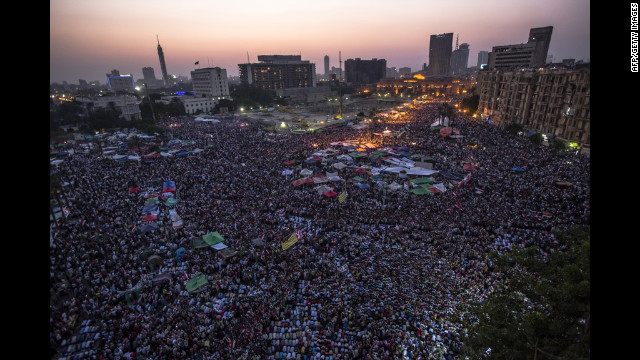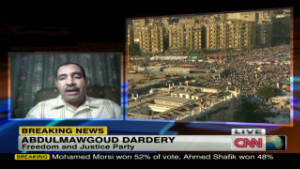Monday, June 25, 2012
On 9:30 AM by Michael Kisula L. No comments
 When the cheers subside in Tahrir Square, Mohamed Morsi will assume
an Egyptian presidency straightjacketed by the country's military, start
work under intense international scrutiny and inherit a country on its
back economically.
When the cheers subside in Tahrir Square, Mohamed Morsi will assume
an Egyptian presidency straightjacketed by the country's military, start
work under intense international scrutiny and inherit a country on its
back economically.
He'll face the skepticism
of people like Mohamed Saleh, one of the throng that waited for
Sunday's declaration of Morsi's victory in Tahrir Square. Even as he
cheered the result, Saleh said the real power in Egypt still lies with
the Supreme Council of the Armed Forces, which took power after the
ouster of longtime strongman Hosni Mubarak.
"They don't give us
power. Mohamed Morsi is just a name of president," Saleh said. "He
doesn't have the power, SCAF has the power."
Egypt's electoral
commission declared Morsi the country's president-elect Sunday after a
runoff with Ahmed Shafik, a former air force general who served as
Mubarak's last prime minister. With the announcement of Morsi's victory,
cheers erupted in Tahrir Square, the Cairo plaza that was the center of
the 2011 revolt that toppled Mubarak.
His supporters already
are pushing for a confrontation with the generals, who recently ordered
an elected, Islamist-dominated parliament dissolved and announced they
would retain legislative power for an indefinite time.
"Will the military
council respect the Egyptian will or not?" asked Abdoul Mawgoud Dardery,
a member of parliament from Morsi's Freedom and Justice Party, the
political arm of Egypt's long-suppressed Muslim Brotherhood. "If it
respects it, we will be able to work together. If it does not, the
military council knows very well where Mubarak is right now."
Muslim Brotherhood candidate triumphs
Dardery said the
Brotherhood and its supporters would remain in Tahrir Square until they
get what they want. Khaled Fahmy, a historian at the American University
in Cairo, said that determination is born of the hard lessons that
followed the ouster of Mubarak, who has been sentenced to life in prison
for ordering the killings of anti-government protesters in the 2011
revolt.
Subscribe to:
Post Comments (Atom)
Search
EGYPT'S LONG ROAD TO PRESIDENCY
 When the cheers subside in Tahrir Square, Mohamed Morsi will assume
an Egyptian presidency straightjacketed by the country's military, start
work under intense international scrutiny and inherit a country on its
back economically.
When the cheers subside in Tahrir Square, Mohamed Morsi will assume
an Egyptian presidency straightjacketed by the country's military, start
work under intense international scrutiny and inherit a country on its
back economically.
He'll face the skepticism
of people like Mohamed Saleh, one of the throng that waited for
Sunday's declaration of Morsi's victory in Tahrir Square. Even as he
cheered the result, Saleh said the real power in Egypt still lies with
the Supreme Council of the Armed Forces, which took power after the
ouster of longtime strongman Hosni Mubarak.
"They don't give us
power. Mohamed Morsi is just a name of president," Saleh said. "He
doesn't have the power, SCAF has the power."
Egypt's electoral
commission declared Morsi the country's president-elect Sunday after a
runoff with Ahmed Shafik, a former air force general who served as
Mubarak's last prime minister. With the announcement of Morsi's victory,
cheers erupted in Tahrir Square, the Cairo plaza that was the center of
the 2011 revolt that toppled Mubarak.
His supporters already
are pushing for a confrontation with the generals, who recently ordered
an elected, Islamist-dominated parliament dissolved and announced they
would retain legislative power for an indefinite time.
"Will the military
council respect the Egyptian will or not?" asked Abdoul Mawgoud Dardery,
a member of parliament from Morsi's Freedom and Justice Party, the
political arm of Egypt's long-suppressed Muslim Brotherhood. "If it
respects it, we will be able to work together. If it does not, the
military council knows very well where Mubarak is right now."
Muslim Brotherhood candidate triumphs
Dardery said the
Brotherhood and its supporters would remain in Tahrir Square until they
get what they want. Khaled Fahmy, a historian at the American University
in Cairo, said that determination is born of the hard lessons that
followed the ouster of Mubarak, who has been sentenced to life in prison
for ordering the killings of anti-government protesters in the 2011
revolt.
loyaniworld is. Powered by Blogger.


0 comments:
Post a Comment